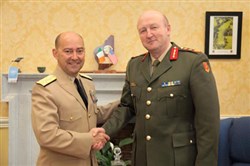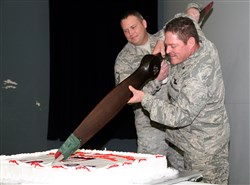December 20, 1995 -- NATO Peacekeeping mission begins in Bosnia, End to Operation Deny Flight
On this date NATO began its peacekeeping mission in Bosnia and officially ended Operation Deny Flight, in which EUCOM forces played a major role.
After the adoption of the Dayton Accords on Nov. 20, 1995, Operation Deny Flight's mission was no longer necessary. On Dec. 15, 1995, the United Nations Security Council officially terminated the resolutions that had authorized the operation, and on Dec. 16, the North Atlantic Council agreed to terminate Operation Deny Flight, effective Dec. 20.
On Dec. 21, 1995, NATO held a formal closure ceremony for Deny Flight in Vicenza. Many of the forces assigned to Deny Flight were transferred to Operation Decisive Endeavor, to provide support for new IFOR peacekeepers in Bosnia.
Operation Deny Flight was a NATO operation that began on April 12, 1993 as the enforcement of a United Nations no-fly zone over Bosnia and Herzegovina. The United Nations and NATO later expanded the mission of the operation to include providing close air support for UN troops in Bosnia and carrying out coercive air strikes against targets in Bosnia. Twelve NATO members contributed forces to the operation and, by its end on Dec. 20, 1995, NATO pilots had flown 100,420 sorties.
The operation played an important role in shaping both the Bosnian War and NATO. The operation included the first combat engagement in NATO's history, a Feb. 28, 1994 air battle over Banja Luka, and in April 1994, NATO aircraft first bombed ground targets in an operation near Goražde. These engagements helped show that NATO had adapted to the Post-Cold War era and could operate in environments other than a major force on force engagement on the plains of Central Europe. Cooperation between the UN and NATO during the operation also helped pave the way for future joint operations. Although it helped establish UN-NATO relations, Deny Flight led to conflict between the two organizations. Most notably, significant tension arose between the two after UN peacekeepers were taken as hostages in response to NATO bombing.
The operations of Deny Flight spanned more than two years of the Bosnian War and played an important role in the course of that conflict. The no-fly zone operations of Deny Flight proved successful in preventing significant use of air power by any side in the conflict. Additionally, the air strikes flown during Deny Flight led to Operation Deliberate Force; a massive NATO bombing campaign in Bosnia that played a key role in ending the war.






